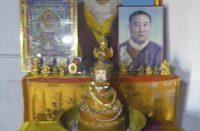
High Peaks Pure Earth has translated a blogpost by Woeser written in March 2015 for the Mandarin service of Radio Free Asia and published on her blog on March 20, 2015.
Prompted by a microblog post by Tibetan writer Pema Norzin, Woeser writes about the difficulties faced by Tibetans in travelling and obtaining passports. Pema Norzin’s microblog post was translated by High Peaks Pure Earth in March 2015.
Previously a rather under-documented issue, in July 2015, both Human Rights Watch and International Campaign for Tibet released reports about the situation inside PRC for Tibetans related to passports.
“Tibetans Face a Passport Dilemma”
By Woeser
Not so long ago, a journalist from the South China Morning Post gave me a call and asked: I read a Weibo post by the Tibetan writer Pema Norzin that all Tibetan people’s passports have been confiscated, why is that?
For me or any fellow Tibetans, this question is not really a question, because this is just the way it is, this is reality. And yet, it is not only foreign journalists who do not understand this, some of those famous Chinese netizens who frequently travel to Tibet are also showing their surprise: Really?! The fact that Tibetans had to hand over their passport never gets reported on at all. Most Chinese people do not know.
With her Weibo post, Pema Norzin, who is the Vice President of the Tibetan Writers’ Association, let the cat out of the bag. Her considerable reputation within China substantiated her comment. On February 24, she wrote:
“Why can’t we travel abroad? Why did they take our passports away three years ago, and why have they not returned them? The confiscation of our passports by the regional government is a violation of the state constitution, it is illegal, why are the law enforcement agencies silent?! I hereby earnestly request all online friends to help by sharing this post, I call on the regional government to return our confiscated passports to us, allow us to apply for passports and to exercise our rights, the same rights as those enjoyed by the citizens of China. Happy New Year! Tashi Delek!”
I told the journalist that according to China’s administrative subdivisions, the Tibetan area spreads across five provinces (including Qinghai, Sichuan, Gansu, Yunnan Provinces and the TAR); each province differs slightly in terms of local policy arrangements, but regarding passport applications, there is no difference; all Tibetans are basically disallowed to obtain one. Of course, there are some who managed to successfully apply, but the number is vanishingly low and the procedures are highly complex and full of outrageous unwritten rules and regulations.
 Nine years ago, I wrote an article titled “Why Do Tibetans Risk Their Lives to Escape to India?”. On September 30 of that year, at the Nangpa La mountain pass of Mount Everest, Chinese border police had shot dead Tibetans who were crossing the border. Amidsts the protests that erupted we also heard voices that wondered why Tibetans decided to take the risk to “illegally migrate” instead of following normal procedures; why don’t they apply for a passport and safely cross the border?
Nine years ago, I wrote an article titled “Why Do Tibetans Risk Their Lives to Escape to India?”. On September 30 of that year, at the Nangpa La mountain pass of Mount Everest, Chinese border police had shot dead Tibetans who were crossing the border. Amidsts the protests that erupted we also heard voices that wondered why Tibetans decided to take the risk to “illegally migrate” instead of following normal procedures; why don’t they apply for a passport and safely cross the border?
I realised that these people did not really understand Tibetan reality and explained patiently: for Tibetans, applying for a passport is a forlorn undertaking. It involves going through countless checkpoints at different levels of the administrative hierarchy; we have to complete endless procedures, endure constant interrogation and even bribe people. Those who obtain a passport after 1 ½ years can consider themselves lucky; most of the times, people are eventually refused. And it makes no difference whether a Tibetan is working for an official work-unit or not; for nuns and monks it is evidently more difficult. Considering this, if Tibetans want to go on a pilgrimage, visit relatives or study abroad, they have no choice but to take the risk and venture on the highly dangerous journey across the Himalayas; they need to endure the rough climate, suffer from starvation, losing thousands of Yuan due to extortion along the way. Even more frightening is the fact that they might be caught halfway, locked up in prison or even pay with their lives. You can be sure that if Tibetans could obtain a passport as easily as other Chinese citizens, they would not choose to go through this hardship. In a nutshell, Tibetans do not enjoy the same basic rights as most other Chinese citizens.
Seven years ago, I wrote another article titled “A Passport Manufacturing Tragedy”. Back then, Sharli Rinpoche of Golog Dungri Monastery in Amdo left China with a false passport, was caught in Hong Kong and detained for two entire months. Foreign media reported that he needed to leave China to raise funds to build schools for local children and repair monasteries, but for political reasons, he could not obtain a passport from local Qinghai authorities, and so he resorted to using a forgery. The so-called political reasons referred to him going India to meet the Dalai Lama. Another case involves two Lhasa residents, a husband and his wife, who wanted to go and visit their son who was a monk in India. The husband was suffering from an incurable illness and wanted to see his son one last time. He managed to eventually get a passport, while his wife was refused. He thus had to make a painful decision; should he stay in Lhasa and die without going to see his son one last time or should he bid an eternal farewell to his wife? In the end, he decided to go to India by himself. His wife stayed behind in Lhasa, going to the visa department every day, begging for a passport, without success. Several months later, she was informed of her husband’s death.
There are too many sorrowful stories revolving around passports, simply too many to count. The reasons why Tibetan people’s passports were confiscated three years ago is related to the Kalachakra Teachings held by the Dalai Lama in January 2012 in India. Over ten thousand Tibetans from within Tibet went to attend and even though the majority were elderly people, the Chinese authorities were extremely angry. In April 2012, a new set of visa regulations were enacted, making the application and approval procedures highly difficult and complex, preventing more or less anyone from being able to pass through the border.
From a document stipulating the revised passport application procedures for Tibetans that was published by RFA on January 20, 2013, we learn that Tibetans have to first submit their passport applications to local government offices in the areas they reside. The documents will be scrutinized at the village, district and county levels and then finally by the TAR public security bureau. Even after the lengthy process, the applicant is required to sign a document guaranteeing to the effect that he would not engage in any “illegal activities” or activities that are “harmful to the nation” while abroad. Even if Tibetans are able to obtain passports and get to travel abroad, they have to surrender the travel document to the authorities within seven days on their return home. They also have to report to the local police and subject themselves to interrogations. Those Tibetans who were already in possession of a passport had to also hand it over to the authorities for screening and investigation, even if it had not yet expired. They were promised to be given a new passport in due time, but this has not happened within the past three years. This is why Pema Norzin asked: Why have they not returned our passports?
Those who had gone to India to attend the Dalai Lama’s teachings were put into camps called “study groups” upon their return. Whether the young or the old, all experienced mental torment and their passports were confiscated. Even those who had not gone to India were not safe. Some did not hand over their passports immediately, thinking that by waiting some time they could perhaps get away. But I heard stories of Tibetans trying to leave the country to travel or for business who were stopped at Beijing or Kunming airports. Some obtained scholarships to go to the US to study. But without a passport, all they could do is decline the offer and regret it for the rest of their lives.
I have a friend in Lhasa who is a painter and who refused to hand over his passport. His work unit called him every single day, pressing him over and over again; in the end, he was fed up and said that if they asked him once more to give up his passport, he would self-immolate. His work unit stopped calling, but then police officers paid him a visit. He told me his thoughts of going to hospital and get a part of his bone cut out from his body into which he would engrave his passport number and then have it put back; it was to be an artwork conveying the message that even if he died, they would never have taken away his passport. In the end, however, he still handed it over without pursuing the idea. A different Tibetan who was engaged in small-scale business once said to me, China talks about the “Chinese dream”, my “Chinese dream” is to get a passport.
Pema Norzin’s Weibo post has already disappeared. It is said that it was reported and labelled as “spreading rumours” and “inciting ethnic hostility” and that it “was firmly rebuked by all Chinese citizens”. Will she be “invited for tea” or warned for revealing the secret that Tibetans are disallowed passports? I heard that the only reason why she posted the message was because she wanted her son to be able to study abroad; she requests basic civil rights as a person who identifies as a citizen of the PRC, so I think there are no reasons to persecute her.
Finally, it needs to be said that Tibetans are not alone; Uyghurs face exactly the same passport dilemma as us.
March 2015






Follow Us!